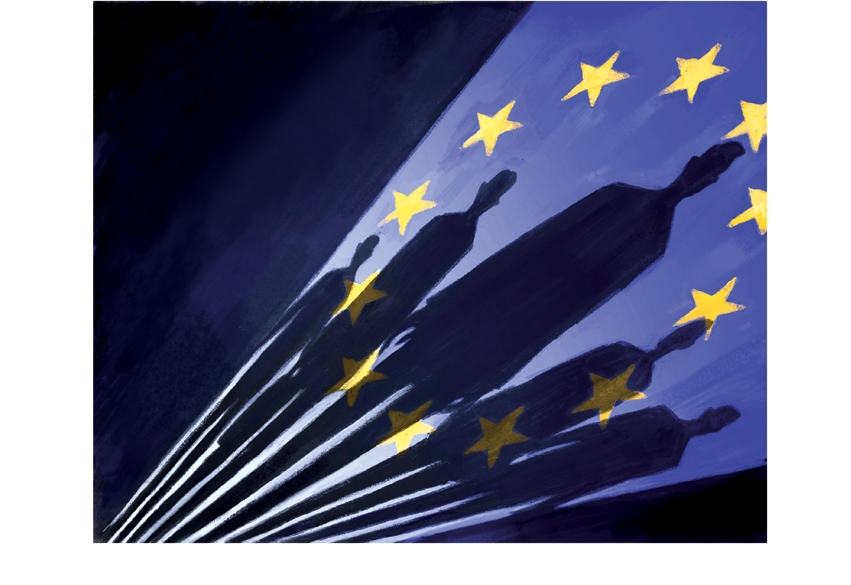Finally, the Eurosceptics have been vindicated. But will their dishonest opponents ever be held to account?
Very rarely in political history has any faction or movement enjoyed such a complete and crushing victory as the Conservative Eurosceptics. The field is theirs. They were not merely right about the single currency, the greatest economic issue of our age — they were right for the right reasons. They foresaw with lucid, prophetic accuracy exactly how and why the euro would bring with it financial devastation and social collapse.
Meanwhile the pro-Europeans find themselves in the same situation as appeasers in 1940, or communists after the fall of the Berlin Wall. They are utterly busted. Let’s examine the case of the Financial Times, which claims to be Britain’s premier economic publication. About 25 years ago something went very wrong with the FT. It ceased to be the dry, rigorous journal of economic record that was so respected under its great postwar editor Sir Gordon Newton.
Turning its back on its readers, it was captured by a clique of left-wing journalists. An early sign that something was going wrong came when the FT came out against the Falklands invasion. Naturally it supported Britain’s entry to the Exchange Rate Mechanism in 1990. In 1992, under the slow-witted editorship of Richard Lambert (in a later incarnation, as director general of the Confederation of British Industry, Sir Richard was to become one of the most sycophantic apologists for Gordon Brown’s premiership), it endorsed Neil Kinnock as prime minister. It has been wrong on every single major economic judgment over the past quarter century.
The central historical error of the modern Financial Times concerns the euro. The FT flung itself headlong into the pro-euro camp, embracing the cause with an almost religious passion. Doubts were dismissed. Here is the paper’s supposedly sceptical and contrarian Lex column on 8 January 2001, on the subject of Greek entry to the eurozone. ‘With Greece now trading in euros,’ reflected Lex, ‘few will mourn the death of the drachma. Membership of the eurozone offers the prospect of long-term economic stability.’ The FT offered a similar warm welcome to Ireland.
The paper waged a vendetta against those who warned that the euro would not work. Its chief political columnist Philip Stephens consistently mocked the Eurosceptics. ‘Immaturity is the kind explanation,’ sneered Stephens as Tory leader William Hague came out against the single currency.
Even as late as May 2008, when the fatal booms in Ireland and elsewhere were very obviously beginning to falter, the paper retained its faith: ‘European monetary union is a bumble bee that has taken flight,’ asserted the newspaper’s leader column. ‘However improbable the celestial design, it has succeeded in real life.’ For a paper with the FT’s pretensions to authority in financial matters, its coverage of the single currency can be regarded as nothing short of a disaster.
Just as bad was the CBI, whose claims to represent British industry as a whole have always been dubious at best. By the mid-1990s a small clique of large corporations were firmly in control, and they had the director general they wanted in the shape of the impeccably well connected Adair (now Lord) Turner, later to become chairman of the disastrous Financial Services Authority and chairman of the Government’s Committee on Climate Change. Few pieces of conventional wisdom are ever too conventional for Lord Turner. His corporate bosses (Niall FitzGerald of Unilever, David Simon of BP, British Airways’ Colin Marshall) claimed that an overwhelming majority of British businessmen backed the single currency — a vital propaganda tool for pro-euro campaigners. The figures used to support these claims were, however, very flimsy indeed: they could only be sustained by ignoring the views of small businessmen, and in due course they were exposed — a crucial early defeat for the pro-euro cause.
Now let’s turn to the BBC. In our Centre for Policy Studies pamphlet, Guilty Men, we expose in detail how the BBC betrayed its charter commitment, lost its sense of fair-mindedness and became in effect a partisan player in a great national debate — all the more insidious because of its pretence at neutrality.
There is only space here to deal with a small amount of our evidence, but this is one example of BBC bias. In the nine weeks leading to 21 July 2000, when the argument over the euro was at its height, the Today programme featured 121 speakers on the topic. Some 87 were pro-euro compared to 34 who were anti. The case for the euro was represented by twice as many figures, interviews and soundbites as the case against. BBC broadcasters tended to present the pro-euro position itself as centre ground, thus defining even moderately Eurosceptic voices as extreme, meaning that they were defeated even before they had entered the debate.
But this was not the worst of the unfairness. The Eurosceptics were too rarely given time to state their reasons for favouring sterling. Their position was too often covered through a paradigm of deep, ‘explosive’, splits within the Conservative party rather than the merits of the policy argument. Again and again the BBC would lead its news coverage on scare stories that failure to join the euro would lead to economic or industrial disaster. When those reports turned out to be false, it failed to correct them. In fact Britain was enjoying record levels of foreign investment: but when Office for National Statistics figures showed this, the BBC made very little of it.
This is not to say that the BBC was consciously biased. It was simply that the high-minded attitudes of many BBC reporters and producers meshed only too well with the pressure groups. But this bias went very deep indeed. As Rod Liddle, then editor of the Radio 4’s Today programme, said: ‘The whole ethos of the BBC and all the staff was that Eurosceptics were xenophobes and there was an end to it. The euro would come up at a meeting and everybody would just burst out laughing about the Eurosceptics.’ Liddle recalls one meeting with a very senior figure at the BBC to deal with Eurosceptic complaints of bias. ‘Rod, the thing you have to understand is that these people are mad. They are mad.’
In truth the Eurosceptics were only too sane. Politicians like Margaret Thatcher, John Redwood, David Owen, William Hague and Bill Cash were mocked — often very cruelly — at the time. But they grasped with stunning clarity the problems the euro would bring. They deserve full credit for their courage and foresight today, and our gratitude too.
•••
Speaking in the House of Commons in 1936, Winston Churchill — then himself a marginal and widely scorned figure — uttered the following words: ‘the use of recriminating about the past is to enforce effective action at the present’. So what are the lessons we should learn from the British argument over the euro?
First, we should cherish that very British trait, eccentricity. Study of the public discourse at the height of the euro debate shows how often pro-euro propagandists isolated their critics by labelling them cranks. Here’s just one example, taken from the Observer columnist Andrew Rawnsley’s column on 31 January 1999: ‘On the pro-euro side, a grand coalition of business, the unions and the substantial, sane, front rank political figures. On the other side, a menagerie of has-beens, never-have-beens and loony tunes.’
Most of Mr Rawnsley’s ‘substantial, sane, front-rank political figures’ came together 12 years ago at the launch of the Britain in Europe campaign to take us into the euro — Tony Blair, Peter Mandelson, Michael Heseltine, Ken Clarke, Charles Kennedy, Danny Alexander. So here’s another lesson: be wary of cross-party alliances. Again and again it is the lonely and cussed figures who stand outside the establishment orthodoxy who are vindicated over time.
One urgent lesson concerns the BBC. The corporation’s twisted coverage of the European Union is a serious problem, because the economic collapse of the eurozone means that a new treaty may be needed very soon — plunging the EU right back into the heart of our national politics.
The problem is that the BBC’s record is dreadful. It simply cannot be trusted not to become part of a partisan propaganda operation: just look at the membership of the BBC Trust. Both its chairman, Lord Patten, and the vice chairman, Diane Coyle, took a heavily partisan position in the euro debate.
The facts concerning Lord Patten are well enough known, but we have unearthed very troubling evidence of bias and misrepresentation concerning Ms Coyle in her role as economics writer for the Independent ten years ago. Here’s an example of her prejudicial analysis: ‘The defenders of sterling are, in the main, a group of elderly men with more stake in their past than in our future. They clothe their gut anti-Europeanism and Little Englandism in the language of rational economic argument.’
Of course Ms Coyle is welcome to voice whatever unfounded and insulting assumptions she wants about the motivations of Eurosceptics — but they call into question her membership of the BBC Trust. The presence of Lord Patten and Ms Coyle as the two most senior figures of the BBC Trust, with a statutory duty to enforce impartiality, is unacceptable, all the more so because of the BBC’s disastrous past record of bias and prejudice.
Finally, it remains essential for our democracy that the pro-euro point of view should be heard. But first of all the euro supporters need to tell us why they tried to put Britain on the calamitous path of joining the single currency. Let’s consider the remark made by Danny Alexander, Chief Secretary to the Treasury, that those he labelled as anti-European isolationists or nationalists were ‘enemies of growth’.
For five years Mr Alexander ran the pro-euro campaign, and had he had his way would have steered Britain directly to economic catastrophe. How dare he denounce Eurosceptics in this way? It’s way past time for the pro-euro supporters to be called to account.
Guilty Men, by Peter Oborne and Frances Weaver, will soon be published by the Centre for Policy Studies with a foreword by Peter Jay. Frances Weaver is a freelance writer and researcher.






Comments